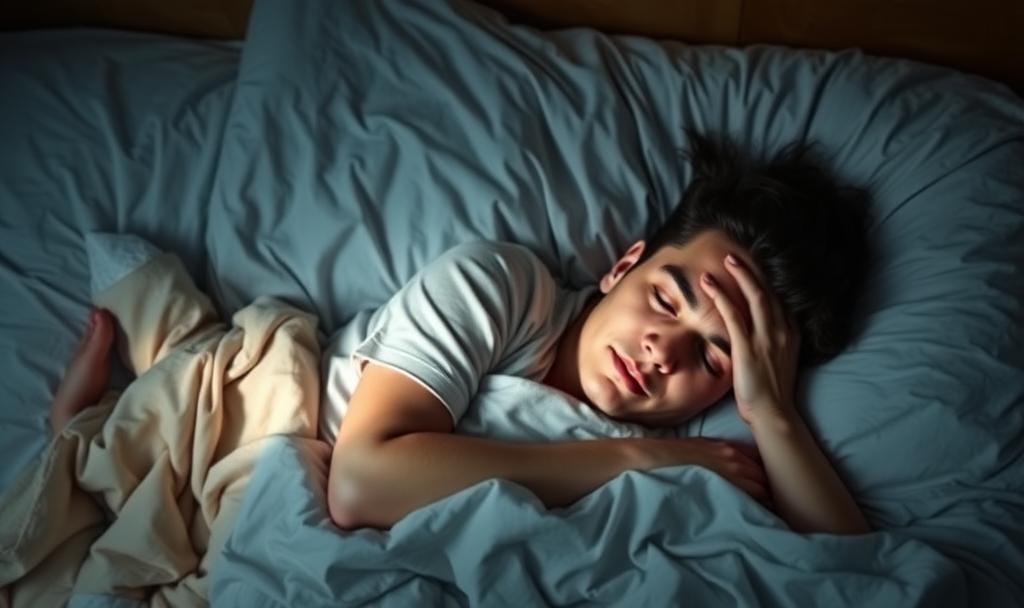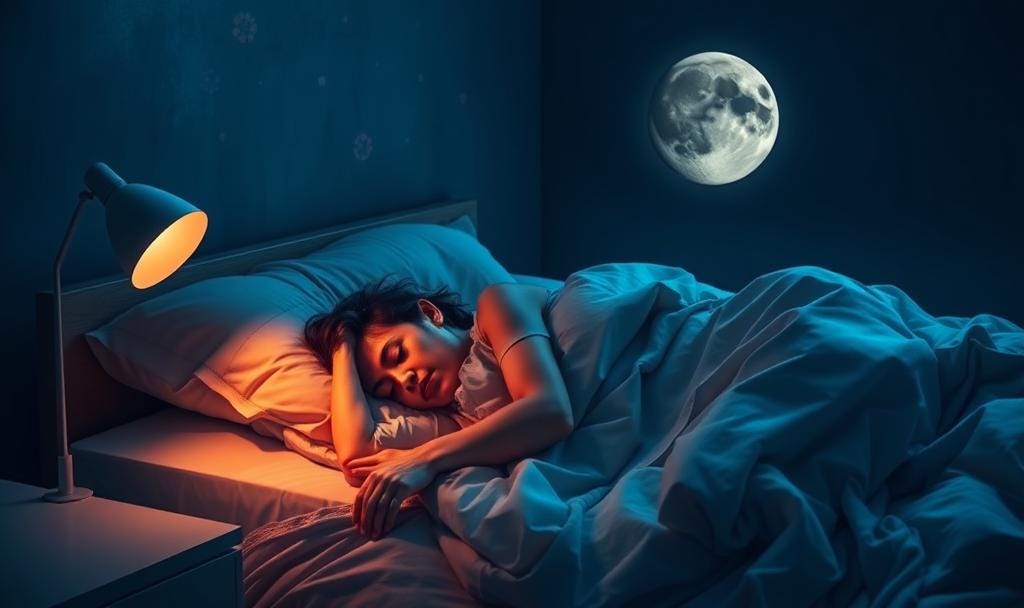Sunday Dispatch: The ADHD Sleep Paradox: Why Your Brain Won't Shut Off When You're Exhausted
Current data presents a striking picture of sleep challenges in the ADHD population.
It’s 3 AM. Your body is screaming for rest—you’ve been exhausted since 9 PM—but your brain is hosting a full-scale conference about tomorrow’s meeting, that embarrassing thing you said in 2007, whether you locked the back door, and the precise lyrics to a song you haven’t heard in fifteen years.
You’re not alone in this maddening experience. And more importantly, you’re not doing something wrong.
What you’re experiencing is the ADHD sleep paradox: a neurological catch-22 where the more exhausted you become, the more your brain resists sleep. Recent research reveals this isn’t about willpower, sleep hygiene, or trying hard enough. It’s about fundamental differences in how ADHD brains regulate arousal, produce melatonin, and transition between states.
Let’s talk about what’s actually happening in your brain at 3 AM—and what the latest research tells us about why traditional sleep advice so spectacularly fails for ADHD adults.
The Scope of Sleep Disruption in ADHD
Current data presents a striking picture of sleep challenges in the ADHD population. Research published in Sleep Medicine Reviews (2024) indicates that 70-80% of adults with ADHD experience clinically significant sleep problems, compared to 30% in the general population. These aren’t occasional restless nights—they represent chronic, persistent sleep disruption that fundamentally alters daily functioning.
Dr Sandra Kooij, founder of the European Network Adult ADHD, notes that sleep problems in ADHD manifest across multiple dimensions: difficulty falling asleep (sleep onset insomnia), frequent night wakings, non-restorative sleep, and difficulty waking at conventional times. “We’re seeing a fundamental misalignment between societal sleep-wake expectations and the ADHD brain’s natural rhythms,” she explains.
The statistics are stark, but they validate what you’ve probably suspected: this isn’t about lacking discipline or failing to follow the right bedtime routine. Your brain is operating on different neurological parameters entirely.
Delayed Sleep Phase Disorder: When Your Brain Runs on Different Time
Among the most significant findings in recent ADHD sleep research is the prevalence of Delayed Sleep Phase Disorder (DSPD). A 2023 study in the Journal of Psychiatric Research found that up to 78% of adults with ADHD show signs of DSPD, compared to just 1-2% of the general population.
DSPD in ADHD isn’t simply being a “night owl.” Neuroimaging studies reveal altered melatonin production patterns, with the ADHD brain beginning melatonin release 1.5 to 2 hours later than neurotypical brains. Dr Philip Asherson from King’s College London’s research team discovered that this delay appears linked to genetic variations affecting both circadian rhythm regulation and dopamine signalling—the same neurotransmitter system implicated in ADHD’s core symptoms.
The clinical implications are profound. Adults with ADHD often describe feeling most alert and productive between 10 PM and 2 AM, precisely when society expects them to wind down. This misalignment creates chronic social jet lag, where individuals perpetually operate against their biological clock.
If you’ve ever felt like you’re genuinely nocturnal whilst everyone else insists you should simply “go to bed earlier,” this research explains why that advice lands with such futility. You’re not fighting against a bad habit—you’re fighting against your brain’s fundamental chronobiology.
The Revenge Bedtime Procrastination Phenomenon
A newer area of investigation involves what researchers term “revenge bedtime procrastination”—the deliberate delay of sleep to reclaim personal time lost during the day. Whilst this phenomenon affects many adults, recent studies suggest it’s particularly pronounced in ADHD populations.
Research from the University of Amsterdam (2024) found that adults with ADHD engage in bedtime procrastination at rates 2.5 times higher than control groups. The study’s authors propose this behaviour serves multiple functions: seeking stimulation when under-aroused, attempting to generate dopamine through engaging activities, and reclaiming autonomy after a day of struggling with executive function demands.
Dr Floor Kroese, who coined the term, explains: “In ADHD, bedtime procrastination becomes entangled with executive dysfunction. The same challenges that make it difficult to transition between daytime tasks also impair the ability to transition to sleep, even when exhausted.”
This resonates deeply with the ADHD experience: the entire day has been spent managing executive function challenges, navigating social demands, and masking symptoms. Night becomes the only time that feels genuinely yours—the only time your brain can pursue what it actually finds interesting without external pressure. Giving that up feels like surrendering the only autonomy you have.
The Melatonin Production Puzzle
Groundbreaking research from multiple laboratories has identified specific differences in how ADHD brains produce and respond to melatonin. A 2023 study in Molecular Psychiatry found that adults with ADHD show:
Delayed melatonin onset by an average of 1.5 hours
Lower peak melatonin levels
Altered melatonin receptor sensitivity
Disrupted coordination between melatonin release and core body temperature drops
These findings suggest that standard melatonin supplementation protocols may be inadequate for ADHD populations. Dr Rachel Schreiber from Stanford’s Sleep Medicine Centre notes, “We’re finding that adults with ADHD often need different dosing strategies, timing adjustments, and sometimes combination approaches that wouldn’t be necessary for neurotypical insomnia.”
This explains why taking melatonin “doesn’t work” for so many ADHD adults. It’s not that melatonin is ineffective—it’s that the standard dosing and timing protocols weren’t designed for ADHD neurophysiology.
The Amplification Effect: How Sleep Loss Worsens ADHD
Perhaps the cruellest aspect of ADHD sleep difficulties is how sleep deprivation amplifies core ADHD symptoms, creating a self-perpetuating cycle. New research from Harvard Medical School’s Division of Sleep Medicine demonstrates that even one night of poor sleep can:
Reduce prefrontal cortex activity by up to 25% in ADHD brains
Increase impulsivity scores by 30-40%
Decrease working memory performance by up to 50%
Elevate emotional dysregulation episodes by 60%
Dr Craig Surman, who led the research, explains: “The ADHD brain already operates with reduced executive function resources. Sleep deprivation essentially depletes an already limited reserve, making every aspect of ADHD more challenging to manage.”
You know this experience intimately: the day after a terrible night’s sleep, everything is harder. Your medication feels less effective. Your patience evaporates. Simple tasks become overwhelming. You can’t hold thoughts in your head. Emotional regulation collapses. And then, exhausted from struggling through the day, you lie awake again that night, perpetuating the cycle.
Longitudinal studies now show that chronic sleep deprivation in ADHD adults correlates with increased rates of medication resistance (reduced stimulant effectiveness), workplace accidents and errors, relationship difficulties, development of comorbid anxiety and depression, and substance use as self-medication for sleep.
WHAT’S BEHIND THE PAYWALL:
You’ve just learned why your brain won’t shut off at night—the neurological mechanisms behind ADHD sleep disruption, from delayed melatonin production to revenge bedtime procrastination.
The complete analysis includes the crucial next sections:
The Hyperarousal Paradox – Why exhaustion makes your brain more alert rather than less, including new EEG research revealing what’s actually happening in your brain when you’re “tired but wired.”
Evidence-Based Interventions That Actually Work – Moving beyond useless sleep hygiene advice to ADHD-specific protocols: chronotherapy and light management, modified CBT-I that accommodates executive dysfunction, pharmacological innovations including dual-release melatonin and orexin receptor antagonists, sensory and environmental modifications (weighted blankets showing 63% improvement in recent trials), and the Sequential Transition Protocol for ADHD brains that struggle with abrupt state changes.
Clinical Perspectives and Future Research – What sleep medicine specialists now understand about ADHD sleep as a fundamental rather than secondary symptom, plus societal and occupational implications including workplace chronotype accommodations.
Plus: Specific protocols you can implement tonight, the latest research on ADHD-specific sleep assessment tools, and precision medicine approaches based on individual chronotypes.
This is the kind of evidence-based, neurologically-informed analysis you get with every subscription. No generic wellness advice, no “just try harder” nonsense—actual research translated into practical understanding.
What you get as a paid subscriber ($12/month or $99/year):
Signal Saturdays (free for everyone): Weekly research insights
DBT Toolkits (Wednesdays): Evidence-based protocols for ADHD brains
Dutch Uncle (Fridays): No-nonsense advice that respects your intelligence
Sunday Dispatch (Sundays): Deep dives into topics impacting ADHDers



